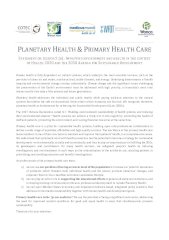
Planetary Health & Primary Care – 67th Session of the WHO Regional Committee for Europe
WONCA Europe has released a joint statement on Planetary Health & Primary Care for the 67th session of the WHO Regional Committee for Europe (Statement on session 5 (b): Improving environment and health in the context of Health 2020 and the 2030 Agenda for Sustainable Development). The statement was prepared in cooperation with the Council of Occupational Therapists for the European Countries, the Health Care Without Harm Europe, Medicus Mundi International, and the World Federation of Occupational Therapists. We would also like to acknowledge Dr Enrique Barros and Dr Ralph Guggenheim from the WONCA Working Party on Environment for their guidance and support in preparing the statement.
You may find the full text of the statement below the video and attached as PDF.
Planetary Health & Primary Health Care
Human health is fully dependent on natural systems, which underpin the most essential services, such as the provision of clean air and water, nutritious food, stable climates, and energy. Underlying determinants of health inequity and environmental change overlap substantially. Climate change and the significant issues challenging the preservation of the Earth's environment must be addressed with high priority, in humanity's most vital interest and for the sake of the present and future generations.
Planetary health addresses the individual and public health, while paying judicious attention to the natural systems that define the safe environmental limits within which humanity can flourish. We recognize, therefore, planetary health as fundamental for achieving the Sustainable Development Goals (SDGs).
The 2017 Ostrava Declaration called for: “Building environmental sustainability of health systems, and reducing their environmental impacts.” Health systems can achieve a triple win in this regard by: protecting the health of staff and patients; protecting the environment, and; saving financial resources at the same time.
Primary health care is a pillar for sustainable health systems, building upon interprofessional collaboration to deliver a wide range of equitable, affordable and high-quality services. The workforce of the primary health care team considers it one of their core tasks to maintain and improve their patients' health, in a comprehensive sense. We understand that systematic work with health promotion has the potential to become a strategy for sustainable development –environmentally, socially and economically, and thus to play an important part in fulfilling the SDGs. As gatekeepers and coordinators for many health services, we safeguard people’s health by reducing overdiagnosis and overtreatment in such ways as the rationalisation of the antibiotic use, assisting patients in prioritizing, and avoiding excessive and harmful investigations.
As professionals of the primary health care team:
- we can use our position of having access to most of the population to increase our patients' awareness of problems which threaten both individual health and the planet, promote behaviour changes, and empower them to live a healthier and more sustainable lifestyle;
- we can play an active role in supporting the educational efforts of general educational institutions, and in shaping training curricula and continuous professional development to include Planetary Health;
- we call upon Member States to develop and implement evidence-based, integrated policy solutions that address environmental sustainability together with human health and development goals.
Primary health care is the “green medicine”. We see the potential of being a significant social actor, addressing the need for improved societal conditions for good and equal health in ways that simultaneously promote sustainability.
- Access
- Public
- Year
- 2020
